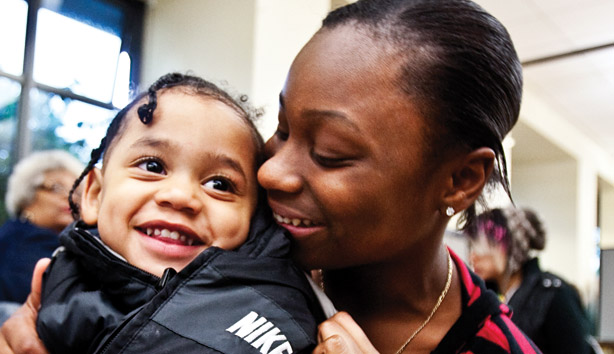The City Urban Perspectives
Caring for Caregivers
Nursing Students Learn Challenges Faced by Grandparents
By Hannah Notess (hnotess@spu.edu) | Photo by Mike Siegel

Families got a chance to relax at the kinship caregiver celebration, held at Rainier Community Center in Seattle, as SPU nursing students provided health screenings, dinner, and childcare.
When parents can't care for their children, it's often relatives who step up. One of every 12 children in the U.S. lives in a household headed by a kinship caregiver, a relative other than a parent such as a grandparent, aunt, uncle, or sibling.
They may not see themselves as doing anything extraordinary. "In some ways, it's just what families have always done," says Barb Wiley, coordinator of the King County Kinship Collaboration. More than 18,000 kinship caregivers live in Seattle's King County. "It's true for my grandparents. They didn't call it kinship care; they just raised my cousins."
But the resources required are extraordinary, especially for grandparents, who may be living on a fixed retirement income and may also be living with chronic diseases. One of the biggest health challenges kinship caregivers face is finding time for self-care.
"They love their grandchildren, and that's the main priority," says Ashley Wolfe '10. "But they give, give, give of themselves and get so burnt out."
As part of their final quarter in the Seattle Pacific University nursing program, five students — Wolfe, Ashli Kirk '10, Jordahshe Loeber '10, Ti Nhong '10, and Eyob Tesfayohannes '10 — partnered with KCKC last spring. They spent time with kinship caregivers, joining them in a class on chronic disease management and visiting their homes to assess health risks, such as the risk of falling.
The quarter culminated with KCKC's annual celebration event, focused on self-care, which the SPU students helped to organize.
"We asked the caregivers, 'What will help you relax?'" says Loeber, "because that's what will help them deal with their chronic diseases."
And the benefits of caring for caregivers are clear. "Supporting kinship families helps keep kids out of the foster care system and connected to their community and their culture," Wiley says.
